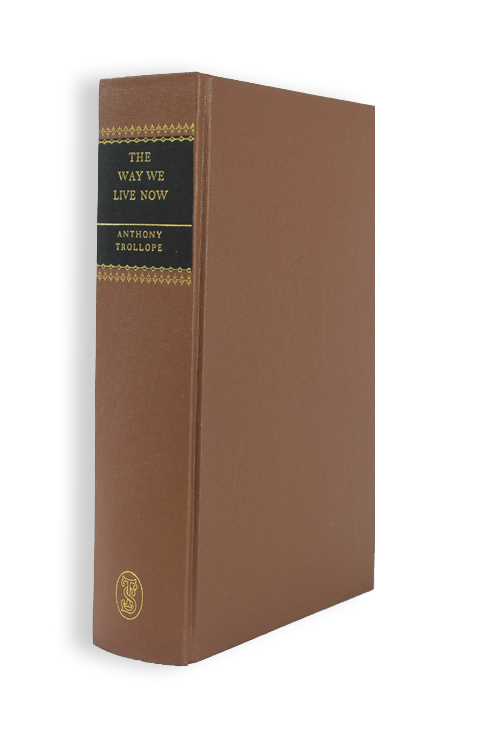Way We Live Now, The
The Trollope Society Edition Clearance Sale is only available in the UK.
Original price was: £35.00.£5.00Current price is: £5.00.
Clearance Sale UK only
Coupons are not valid with this offer
Available to members only
Introduction by Noel Annan
844 pages
London, Chapman and Hall, 1875. 2V.
Many see this as Trollope’s nearest attempt at ‘the great novel’, conceived on the Dickensian scale of Bleak House or Little Dorrit. Others remember it for the monumentally savage portrait of the great financier, railway stock promoter, Member of Parliament and swindler, Augustus Melmotte. But in Trollope’s own notes it is headed ‘The Carbury Novel’: and the reason is not far to seek. The chief character was intended to be Lady Matilda Carbury ‘an aspiring but unsuccessful authoress, fatuously devoted to her disreputable son Sir Felix.’ Even without our knowledge of the Trollope family’s somewhat chequered financial history, it is hard not to see the elements of Anthony’s mother appearing in the relentless novelist who could:
write after a glib, commonplace, sprightly fashion, and had already acquired the knack of spreading all she knew very thin, so that it might cover a vast surface. She had no ambition to write a good book, but was painfully anxious to write a book that the critics should say was good.
However, as so often in the case of Anthony Trollope, another character took over. Melmotte and his massive swindling schemes increasingly come to dominate the action of this fascinating, teeming novel. Some find his original in George Hudson, the railway king, whose world collapsed in ruins in 1849. Some find him in Albert Gottheimer, a central European who was perhaps the first to discover how a gullible public could be exploited by the unscrupulous, who were in turn protected by the Limited Liability Company. Gottheimer changed his name to Grant, and he, too, became a member of Parliament. So did George Hudson: and so does Melmotte.
Of these three outrageous rogues, the most fascinating is Trollope’s – and in Melmotte’s spectacular appearance, after his disgrace, in the Chamber of the House of Commons, Trollope gives us one of the most dramatic scenes in all Victorian fiction. Towards the end of the fourteen months he spent writing this remarkable novel, he crossed out ‘The Carbury Novel’ and wrote down The Life We Live Now. Even if it was not his original intention, he had given us a book which had its origins in his belief that contemporary England had become stained purple by financial profligacy, large scale fraud, and a total lack of the most elemental principles of honesty. It is The Way We Live Now.
